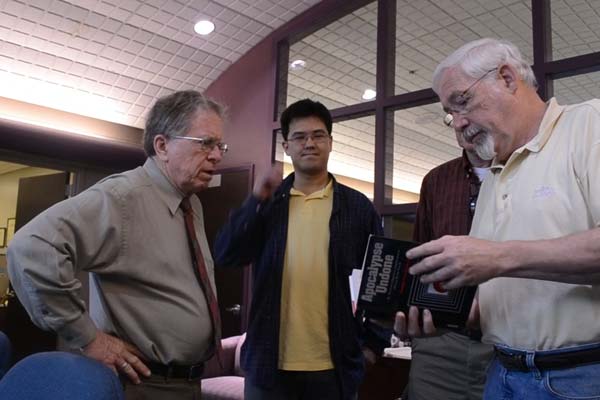
by Ellen Butterfield | May 14, 2015 | News Slider
Nearly 400 letters from a German prisoner of war camp near Chattanooga have been donated to the Beaman Library, where a Lipscomb professor is working to translate them in time for a program in the autumn to observe the 70th anniversary of the end of World War II. The letters were donated by Curtis Peters, who discovered the letters, drawings and photos jammed in a Cornflakes box while cleaning out the house of his wife’s great aunt after she died. The road to Lipscomb for the letters began when Dr. Tim Johnson was in Chattanooga doing historical research into the Mexican War. A woman in a local cafe recognized the Lipscomb professor’s passion for history and introduced him to Peters, who said he hoped the letters could be translated, giving him more insight into his family’s history. That’s when Lipscomb foreign language professor Charlie McVey was contacted, due to his extensive training in German, and the library received the grant that will enable him to translate the letters. Working on these letters shifted his perspective of POW camps in general, McVey said. “I was just flabbergasted that these people were writing these letters back and were so effusively thankful and grateful,” McVey said. “Of course, also in these letters they’re asking for things,” McVey said. “One guy even puts his foot down on the paper and outlined his shoe saying ‘This is the size shoe I need.'” Going from being treated well by the Stribling family, who extended Christian character to their prisoners, to going back to a Germany in shambles was a shock, according to what McVey has...
by Cory Woodroof | Nov 17, 2014 | News Slider
The struggles, sacrifices and successes of African Americans during one of the nation’s most turbulent times were at the forefront of conversation in Shamblin Theatre Saturday morning. In conjunction with Lipscomb’s remembrance of the Battle of Nashville’s 150th anniversary, the Department of History, Politics & Philosophy hosted a Civil War symposium that detailed various aspects of African-American life during the war. “The African-American Experience in the Civil War Era” brought three noted historians to share their takes on three different-yet-synergetic topics. James M. McPherson, a Pulitzer-winning author and historian, John F. Baker, a genealogy expert and Joseph Glatthaar, an author and historian, all spoke about different sections of what African Americans endured during that time. Tim Johnson, a professor in the department and the driving force in Lipscomb’s reflection of the battle’s sesquicentennial, said when planning the event, this particular topic came to mind. “We wanted to focus on the African-American experience,” Johnson said. “We wanted to help tell the Nashville community about a story that is often overlooked. That seemed an appropriate theme, given the number of African-American Union soldiers who fought in Nashville in December 1864.” In his talk titled “The Washingtons of Wessyngton Plantation: Stories of My Family’s Journey to Freedom,” Baker shed light on the story behind the plantation where his ancestors worked. Baker said he conducted genealogical and historical research on the local plantation called Wessyngton, located in Robertson County. “My research at Wessyngton started sort of accidentally,” Baker said. “When I was in the seventh grade, we used a social studies textbook called ‘Your Tennessee,’ and I came across this photograph entitled ‘Black...
by Brianne Welch | Sep 29, 2014 | News Slider
This December marks the 150th anniversary of the Battle of Nashville, and to commemorate the battle, Lipscomb is hosting a variety of events. Much of the battle took place around Lipscomb, and the school sits on a large portion of the battlefield. Tim Johnson, professor of history at Lipscomb and a nationally recognized expert in the Civil and Mexican Wars, has organized different events to mark the occasion, and the events take a look at one of the more unique aspects of the battle. “Something else that most people don’t know about, that is really important, is that more African American Union soldiers fought in the Battle of Nashville than any other Civil War battle,” Johnson said. The battle took place Dec. 15-16, so there will be events through the middle of November. The first event was a kickoff symposium at Historic Travellers Rest on Sept. 18. The next event will be Tuesday Sept. 30 at 7 p.m. in Ward Lecture Hall where a showing of the movie “Glory” will take place followed by a post-movie discussion on heroes. “We have three movies,” Johnson said. “We’re calling it the Civil War on the Silver Screen.” The other two movie dates are Oct. 14 that will show “Lincoln”, and Oct. 28 featuring “Copperhead”. The final day of events is Nov. 15. Professor Johnson said it will be the “really big culminating symposium” that will involve several guest speakers including Pulitzer Prize winning Civil War historian James McPherson from Princeton, Joesph Glatthaar of the University of North Carolina and John Baker, a local historian and genealogist. That event will take place in...


